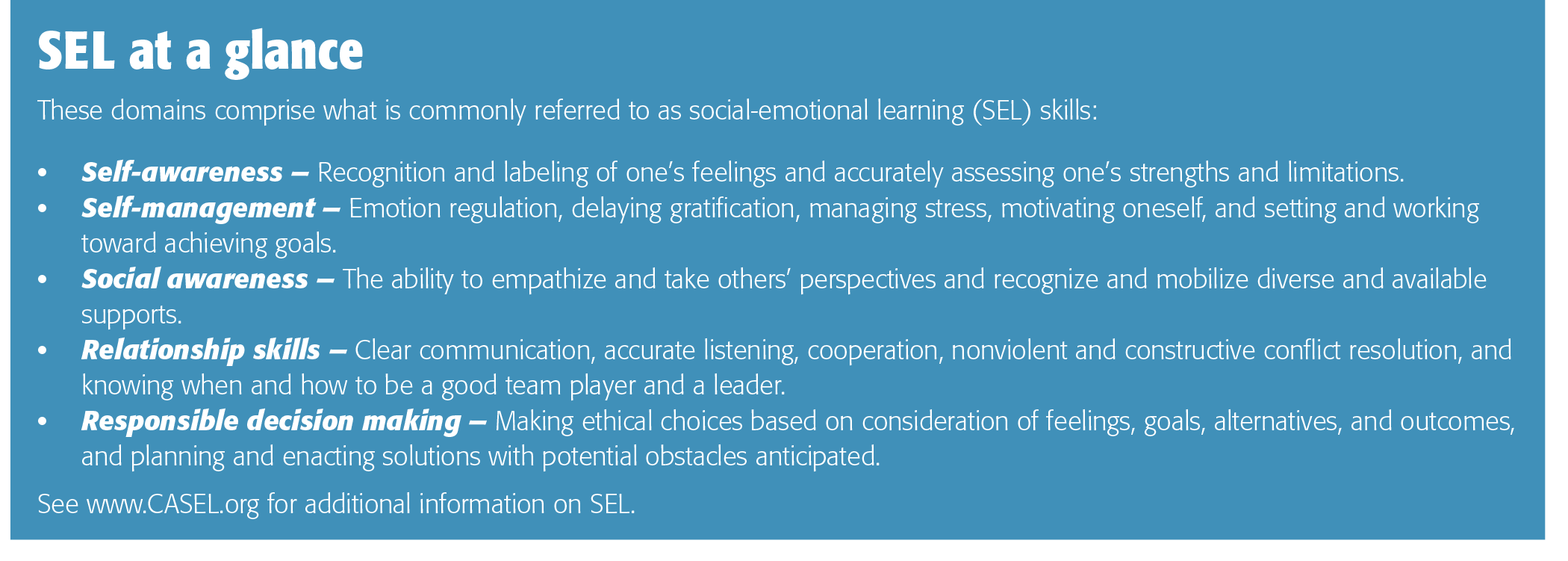
Students can more easily meet the Common Core’s tougher English language arts standards if they develop critical social-emotional learning skills before or as they go along.
What’s been surprisingly left out of discussions about the Common Core State Standards is the existence of an underlying set of attributes and competencies necessary for content-area success. Wraga (2010) says this reflects a narrow definition of what it means to be college- and career-ready. He decries the “near-total silence on the role of education in promoting individual development and democratic forms of governance” as limiting students’ future accomplishments.
What we know about true success in college and life supports this view. College poses many challenges, particularly to students from disadvantaged backgrounds, whose dropout rates have been estimated as high as 90%. There is a tremendous emotional charge associated with many aspects of college, ranging from fears about family identity and acceptance, loss of peer groups, concerns about fitting in and managing the workload, implications of choices of courses and majors, how to establish a range of new relationships with peers and adults, and lifestyle choices about the use of leisure time, studying, eating, and sleeping. We know from an analysis of college dropouts that such outcomes are less the result of intellectual shortcomings and more due to deficiencies in the social-emotional and character competencies necessary for dealing productively with the challenging life situations of college and of just about every other schooling situation (Fink & Geller, 2013; Savitz-Romer & Bouffard, 2012; Zins et al., 2004).
Ultimately, we are preparing students for more than college and careers. We are preparing them to be productive members of society and valued members of their families and workplaces. We want students to adopt a collaborative stance, embracing diversity and being ready for the increasingly globalized and interconnected world that they inhabit. I’d name this College-, Career-, and Contribution-Ready. To meet this benchmark, students need more than academic skills.
It is an irony but also a great potential opportunity that the same skills being neglected in the implementation of the Common Core are those that are ultimately most beneficial for success outside of school. Fortunately, there is emerging agreement about the skills students must possess to successfully master the content of the Common Core and to find themselves advancing in college and/or careers (ASCD, 2012; Blackwell, Trzesniewski, & Dweck, 2007). Students must:
- Be able to elaborate their reasoning clearly, support their own arguments, and challenge their classmates respectfully;
- Apply strategic thinking, including analyzing their own strategies and developing metacognitive skills;
- Believe in the value of hard work and resilience and possess a mindset supportive of perseverance in the face of difficulty;
- Be oriented toward independence and responsibility for learning and believe that they ultimately are responsible for what they do with their learning, which requires integrity (and this transfer needs to be encouraged through distinguished teaching); and
- Possess social and emotional competencies.
These skill areas are similar to those often described as “the four C’s” of 21st-century skills: communication, collaboration, critical thinking, and creativity (Beers, 2011). Labels and minor differences aside, systematically building these skills in students is not part of most teachers’ training, but it is vital to their professional functioning and, often, evaluation. For example, it is hardly possible to imagine how a teacher would become proficient, let alone distinguished, in the widely used Danielson Framework (Danielson, 2008) if his or her students were lacking in the skills we have been discussing.
Moreover, there is an important link between the social-emotional and character development required by the 21st-century skills set and one of the Common Core’s central focuses: students’ engagement with text.
Students who do not have a nuanced understanding of emotions are unlikely to see deep meaning in much of the literature they read and are less likely to be engaged in it.
Engaging with text
The Common Core requires students to engage more deeply with more complex text than before. It requires students to clearly understand vocabulary rather than to infer meaning from context, to understand the role and voice of the author, and to have a sense of the author’s perspective and purpose. It calls for more conversations among classmates about what is being read, more journal keeping, and more teacher input and dialogue. Those standards inevitably will foment disagreements and call for clear communication, clarifying statements, and queries. They will provide opportunities to resolve conflicts and arrive at common or separate understandings. And because the Common Core aspires to move children to new levels of comprehension, it must be built on and connected to past reading, vocabulary, and overall knowledge. One of today’s implementation problems is that students are embarking on meeting standards for which they have not had adequate preparation or experience.
This means students will:
- Encounter a larger number of unfamiliar words;
- Spend more time intensely focusing on text;
- Spend more time in group discussions about the meaning of text and the author’s perspective;
- Focus more on formulating and communicating their analyses of text;
- Engage in addressing the views of classmates constructively; and
- Connect present reading to past reading and other knowledge.
Each of the above situations is comprised of additional components and segments that must go well if the whole is to go well. And these will be repeated for a good number of students throughout the year, often in more than one subject area. Careful analysis of text is as important in math, science, and social studies as it is in language arts. In other subject areas such as art, music, health, physical education, and languages, as well as in content and skill areas such as computers and robotics, taking perspective and working with classmates play roles as strong to practical success as text mastery.
Clearly, mastering the tasks of Common Core instruction requires character and social-emotional competencies. And this requires schools to have a culture and climate that exemplifies and encourages those traits. James Comer (2003) once said children are not taught character as much as they “catch” it from breathing the climate of the school in which they spend so much of their time.
The changes called for by the Common Core require emotion recognition and management, especially when encountering many strong feelings such as stress, anxiety, frustration, and disappointment. They also require self-regulation to sustain long periods of focused concentration and to allow for reflection; problem solving to figure out the meaning of text, reconciling differing points of view, and planning and carrying out various assignments. In addition, children must learn empathy and to take others’ perspectives, including authors and their characters. These are often referred to as social-emotional learning (SEL) skills. (See a summary of social-emotional domains in the sidebar below.)

A comprehensive meta-analysis of over 200 studies of SEL implementation (Durlak et al., 2011) found that well-implemented SEL is linked to student gains in social-emotional skills, improved attitudes about self, others, and school, positive classroom behavior, and 10 percentile-point gains on standardized achievement tests. Also, negative behaviors that compromise academic and life success, such as conduct problems, aggressive behavior, and emotional distress, were significantly reduced.
Still, there is some skepticism about the relevance of character and social-emotional skills being taught in schools, including among those who feel that such work is the province of the home. Yet for educators being evaluated based on student performance, it seems like an unwise and risky strategy to delegate such an essential part of the learning context entirely to others outside the school. To put a finer point on it: Even if there was no concern with the whole child and only a concern with the child’s intellectual development and academic accomplishments, educators would still want to make social-emotional and character development and a positive, respectful school culture and climate among their highest concerns.
SEL and vocabulary
The area of vocabulary is a good illustration of the convergence between the Common Core and the role of school and classroom climate and students’ SEL skills. Vocabulary does not simply represent the definitions of words. Vocabulary refers to the labeling of often complex constructs necessary to understand an increasingly complex reality. Those writing about emotion vocabulary, emotion recognition, and emotion awareness all agree that the simplification of emotion — using mad, sad, and glad as primary labels for the emotional states of self and others — is highly problematic. Such simplification blurs nuances in relationships and situations that are important to understanding them clearly and navigating them successfully. Further, our capacity to constructively think and act when we are “mad” is much more limited than when we are “frustrated,” “puzzled,” “annoyed,” or even “put down,” — all of which are alternative and often more likely accurate labels to attach to situations than “mad.” Similarly, perceiving that one is “mad” at you or others forecloses possibilities that might be present with a more accurate emotion label. There are many behavioral implications of this, in and out of the classroom, and that is why the skill area of emotional vocabulary is such a strong focus of curricula for promoting social-emotional and character development. Indeed, such curricula, when effective, build these skills over a series of years, to the level of sophistication needed for college and career success (Durlak et al., 2011).
Vocabulary is similarly important in every content area. When the meaning of words is not clear, and these words are used often and are scaffolding for other concepts, the structure is weak and unlikely to survive. Frey, Fisher, and Nelson (2013) found that emphasizing academic vocabulary across elementary schools in a very low-performing school district in Texas over a five-year period was essential to improving students’ academic performance and sending them to middle schools with an improved attitude, greater skills, and higher likelihoods of success, especially where vocabulary emphasis was continued.
The threads of character must touch the threads of knowledge at each and every point, or else there is a chance that the tapestry will unravel.
Students who do not have a nuanced understanding of emotions are unlikely to see deep meaning in much of the literature they read and are less likely to be engaged in it. Students who do not deeply understand the meanings conveyed by the language of math concepts will have a difficult time carrying out the relevant operations in domains not directly covered by examples provided. Teaching to the test might be successful for test scores but not at all helpful for promoting flexible knowledge use in life and vocational contexts. Indeed, the Common Core elements require thinking strategically, understanding deeply, using evidence, providing justification, challenging and supporting effectively, and researching carefully. These are habits of learning and living that are not only advantageous to math and reading but also to the arts, science, history, and civics, among other areas. Correspondingly, where these habits are lacking, we are not likely to see creativity, innovation, integrity, and solid progress. Vocabulary — know what you and others are talking about and what you are reading and writing about — is one of those habits. When children lack the tools for navigating everyday academic situations, we are more likely to see them experiencing crises in character and the deleterious effect that these have on the contexts in which they occur (Elbot & Fulton, 2008).
These points have implications for managing classroom procedures, improving student behavior, and organizing the physical environment. Students must understand what is happening, why, what is expected of them, and how they can go about meeting those expectations. In essence, the Common Core requires a distributed leadership approach to classroom management; approaches that focus on compliance, particularly at the expense of understanding and collaboration, will not build student skills and generalizable knowledge (Elias & Trusheim, 2013).
The real high stakes: Children’s future
Envision what happens when students enter a school without the prerequisite SEL skills and without the norms and mindset essential for sustained learning. Imagine the particular challenges for students from disadvantaged backgrounds or with special education needs who may find themselves at an even greater distance from the normative expectations and skill sets assumed by Common Core pedagogy. Students and staff alike face a catching-up process that simultaneously hampers advancement. So the race to the top — more like scaling a steep mountain to some — becomes progressively difficult and frustrating because demands accelerate even while progress is made. Every step forward seems to reveal more of an ever-growing mountain. Discouragement follows, almost inevitably.
None of this has to happen this way. Before implementing the Common Core, schools should have had the opportunity to transform their own cultures in ways that systematically build SEL skills. Then the Common Core could have been phased in, with students and pedagogy ready for the instructional activities required to master greater academic content and challenges. If we are unwilling to turn back the clock, then we must at least suspend the costly and time-eating assessment process so schools can devote time and resources to building culture, climate, character, and SEL even while implementing the Common Core. With adequate time and resources, schools can make significant inroads in these areas over three to five years. Then teachers and students will have greater capacity to implement the Common Core successfully and in ways that are more likely to become part of students’ intellectual life, rather than something to master for a test score.
Clearly, the Common Core would be strengthened if considerations about their real-world implementation were focused on research about what supports young people’s flourishing. That research tells us that academic achievement alone should be one thread in the tapestry of education (Dunkelblau, 2009; Elbot & Fulton, 2008; Elias, 2009). The threads of character must touch the threads of knowledge at each and every point, or else there is a chance that the tapestry will unravel. Social-emotional and character development, including a rich constellation of core ethical and civic values, must be intertwined with every strand if children are to use their knowledge for good and not ill, and to serve not only themselves but others. We have had a misplaced priority on preparing children for a life of tests. This must be more than balanced by preparing them for the tests of life so they truly will be college-, career-, and contribution-ready.
References
ASCD. (2012). Making the case for educating the whole child. Alexandria, VA: Author.
Beers, S. (2011). Teaching 21st-century skills: An ASCD action tool. Alexandria, VA: ASCD.
Blackwell, L.S., Trzesniewski, K.H., & Dweck, C.S. (2007). Implicit theories of intelligence predict achievement across an adolescent transition: A longitudinal study and an intervention. Child Development, 78 (1), 246-263.
Comer, J. (2003). Transforming the lives of children. In M.J. Elias, H. Arnold, and C. Steiger-Hussey (Eds.), EQ + IQ: Best practices in leadership for caring and successful schools (pp. 11-22). Thousand Oaks, CA: Corwin Press.
Danielson, C. (2008). The handbook for enhancing professional practice: Using the Framework for Teaching in your school. Alexandria, VA: ASCD.
Dunkelblau, E. (2009). Social-emotional and character development: A laminated resource card for teachers, for students, for parents. Port Chester, NY: National Professional Resources.
Durlak, J.A., Weissberg, R.P., Dymnicki, A.B., Taylor, R.D., & Schellinger, K.B. (2011). The impact of enhancing students’ social and emotional learning: A meta-analysis of school-based universal interventions. Child Development, 82 (1), 405-432.
Elbot, C. & Fulton, D. (2008). Building an intentional school culture. Thousand Oaks, CA: Corwin.
Elias, M.J. (2009). Social-emotional and character development and academics as a dual focus of educational policy. Educational Policy, 23 (6), 831-846.
Elias, M.J., & Trusheim, W. (2013, July 25). Beyond compliance: Rethinking discipline and codes of conduct. Education Week. www.edweek.org/ew/articles/2013/07/25/37elias.h32.html.
Fink, K., & Geller, K. (2013). Integrating Common Core and character education: Why it is essential and how it can be done. Washington, DC: Character Education Partnership.
Frey, N., Fisher, D., & Nelson, J. (2013). Todo tiene que ver con lo que se habla: It’s all about the talk. Phi Delta Kappan, 94 (6), 8-13.
Savitz-Romer, M. & Bouffard, S. (2012). Ready, willing, and able: A developmental approach to college access and success. Cambridge, MA: Harvard Education Press.
Wraga, W.G. (2010, August 18). Dangerous blind spots in the Common Core Standards. Education Week. www.edweek.org/ew/articles/2010/08/18/01wraga.h30.html.
Zins, J.E., Weissberg, R.P., Wang, M.C., & Walberg, H.J. (Eds.). (2004). Building academic success on social and emotional learning: What does the research say? New York, NY: Teachers College Press.
CITATION: Elias, M.J. (2014). Social-emotional skills can boost Common Core implementation. Phi Delta Kappan, 96 (3), 58-62.
ABOUT THE AUTHOR

Maurice J. Elias
MAURICE J. ELIAS is a professor of psychology, director of the Social-Emotional and Character Development Lab , cofounder of the Collaborative Center for Community-Based Research and Service, and codirector of the Academy for SEL in Schools , all at Rutgers University, New Brunswick.He is the author of Nurturing Students’ Character: Everyday Teaching Activities for Social-Emotional Learning .










